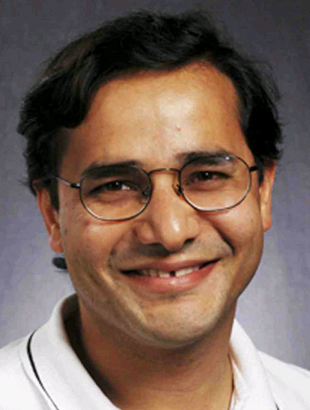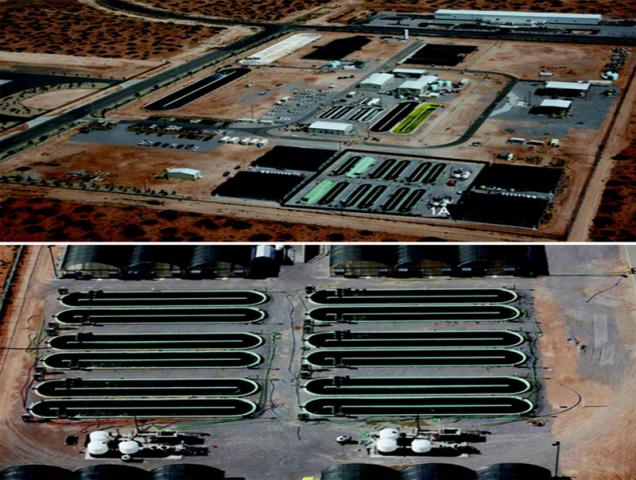
 CSE Prof. Vineet Bafna was on the roster of experts who spoke at the Green Revolution 2.0 symposium March 12-13 in the Qualcomm Institute, organized by the California Center for Algal Biology and the Center for Food and Fuel for the 21st Century. The bioinformatics expert addressed the “Ecology of Open Algae Ponds for the Production of Biofuels,” noting that algae are great feedstocks for biofuels and other products, but the challenge is to get yield at low cost. (In principle, microalgae may produce between 10 and 100 times more oil per acre than traditional crops, but that has not been achieved in an industrial setting.) “There is a general understanding in ecology that diversity is good for productivity, and that precept might be useful for industrial production,” explains Bafna. “But we don’t know that these ecological ideas can work in an industrial setting.”
CSE Prof. Vineet Bafna was on the roster of experts who spoke at the Green Revolution 2.0 symposium March 12-13 in the Qualcomm Institute, organized by the California Center for Algal Biology and the Center for Food and Fuel for the 21st Century. The bioinformatics expert addressed the “Ecology of Open Algae Ponds for the Production of Biofuels,” noting that algae are great feedstocks for biofuels and other products, but the challenge is to get yield at low cost. (In principle, microalgae may produce between 10 and 100 times more oil per acre than traditional crops, but that has not been achieved in an industrial setting.) “There is a general understanding in ecology that diversity is good for productivity, and that precept might be useful for industrial production,” explains Bafna. “But we don’t know that these ecological ideas can work in an industrial setting.”
 To test his hypothesis, Bafna’s team did a year-long experiment in which they monitored the prokaryotic and eukaryotic composition of an algae pond (pictured), using genome sequencing to assess the taxonomic composition and diversity in the pond. In addition to genomic sampling, they used phenotyping to gauge various measures of pond health. “We managed to optimize productivity of biomass over the course of a year,” says Bafna. “Our results strongly suggest that diversity is important for pond productivity, and even in a managed setting, open ponds behave like natural ecosystems.” The team’s results, as Bafna explained to the FF21 annual conference, indicate that algal diversity promotes production, and that understanding the ecology of open algae ponds for the production of biofuels is critical to managing their output of biomass energy and other products. The study was funded by NSF and carried out in a partnership with FF21 director Stephen Mayfield and Biological Sciences professor Jonathan Shurin (both from UC San Diego). Bafna also thanked collaborators at Sapphire Energy, Life Technologies and SDSU.
To test his hypothesis, Bafna’s team did a year-long experiment in which they monitored the prokaryotic and eukaryotic composition of an algae pond (pictured), using genome sequencing to assess the taxonomic composition and diversity in the pond. In addition to genomic sampling, they used phenotyping to gauge various measures of pond health. “We managed to optimize productivity of biomass over the course of a year,” says Bafna. “Our results strongly suggest that diversity is important for pond productivity, and even in a managed setting, open ponds behave like natural ecosystems.” The team’s results, as Bafna explained to the FF21 annual conference, indicate that algal diversity promotes production, and that understanding the ecology of open algae ponds for the production of biofuels is critical to managing their output of biomass energy and other products. The study was funded by NSF and carried out in a partnership with FF21 director Stephen Mayfield and Biological Sciences professor Jonathan Shurin (both from UC San Diego). Bafna also thanked collaborators at Sapphire Energy, Life Technologies and SDSU.
Read the news release about the Green Revolution 2.0 symposium.

